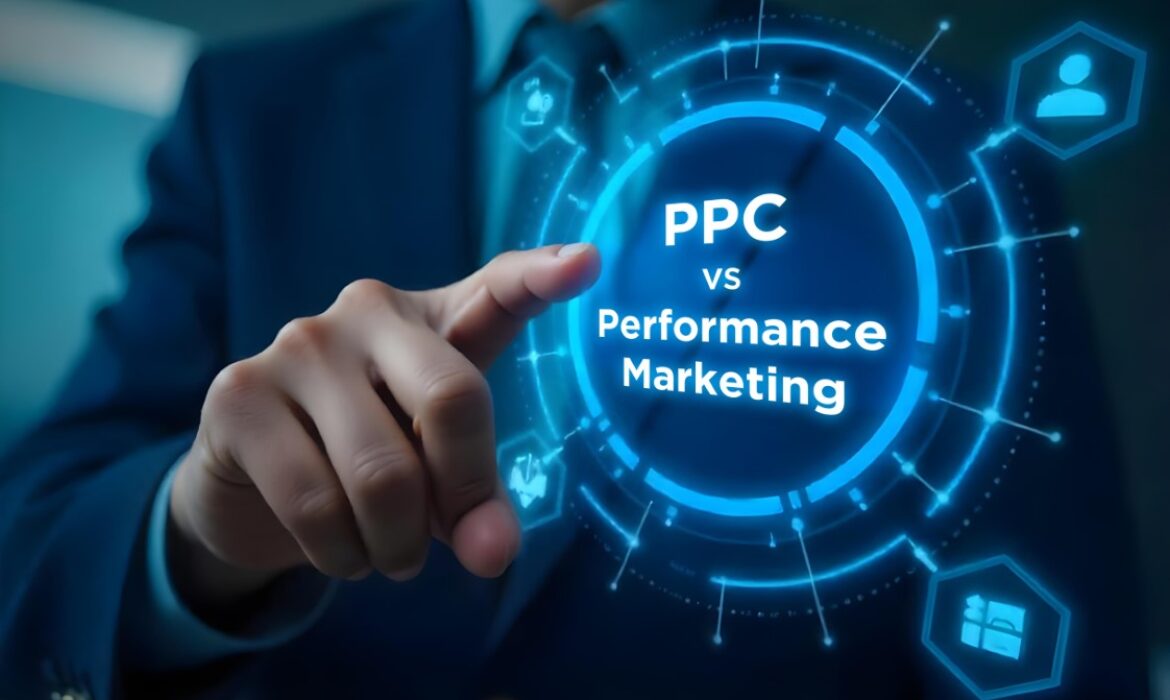PPC vs. Performance Marketing: A Comprehensive Overview

When it comes to online marketing, you've probably heard terms like PPC and performance marketing thrown around. While they're related, they're not exactly the same thing. This article provides a comprehensive overview of PPC vs. performance marketing, breaking down their differences, similarities, and when to use each.
What is PPC (Pay-Per-Click) Marketing?
PPC, or Pay-Per-Click, is a digital advertising model where you pay each time someone clicks on your ad. These ads appear on search engines (like Google Ads), social media platforms (like Facebook Ads), and other websites. The most common form of PPC is search engine advertising, where you bid on keywords related to your business. When someone searches for those keywords, your ad may appear at the top or bottom of the search results.
Key Characteristics of PPC:
Direct Payment for Clicks: You only pay when someone clicks on your ad, making it a highly measurable form of advertising.
Keyword Targeting: You target specific keywords to reach people who are actively searching for products or services like yours.
Ad Placement Control: You have some control over where your ads appear, allowing you to target specific demographics and interests.
Quick Results: PPC can drive traffic to your website relatively quickly, making it a good option for short-term campaigns or immediate needs.
What is Performance Marketing?
Performance marketing is a broader term that encompasses any marketing strategy where you only pay when a specific action is completed. This action, known as a "conversion," could be a sale, a lead generation form submission, a download, or any other measurable outcome.
Key Characteristics of Performance Marketing:
Payment Based on Results: You only pay when a desired action is taken, making it a highly accountable form of marketing.
Diverse Channels and Tactics: Performance marketing can utilize various channels, including PPC, affiliate marketing, social media advertising, native advertising, and more.
Focus on ROI: The primary focus is on return on investment (ROI), ensuring that marketing spend directly contributes to business goals.
Data-Driven Optimization: Performance marketing relies heavily on data analysis to optimize campaigns and improve results.
PPC vs. Performance Marketing: Key Differences
The main difference between PPC and performance marketing is that PPC is a tactic within the broader strategy of performance marketing. Think of it like this: performance marketing is the overall goal (driving specific actions and achieving ROI), while PPC is one of the tools you can use to get there.
Here's a table summarizing the key differences:
| Feature | PPC | Performance Marketing |
| Payment Model | Pay-per-click | Pay-per-action (e.g., sale, lead, download) |
| Scope | A specific advertising tactic | A broader marketing strategy |
| Focus | Driving traffic to a website | Achieving specific business outcomes and ROI |
| Channels | Primarily search engines and some social media | Multiple channels, including PPC, affiliate, social, etc. |
| Measurement | Clicks, impressions, click-through rate (CTR) | Conversions, ROI, cost per acquisition (CPA) |
When to Use PPC:
Driving immediate traffic: If you need to quickly generate traffic to your website for a promotion or new product launch, PPC can be a good option.
Testing different keywords and ad copy: PPC allows you to quickly test different variations of your ads to see what resonates best with your target audience.
Targeting specific demographics and interests: PPC platforms offer advanced targeting options, allowing you to reach specific segments of your audience.
Retargeting website visitors: You can use PPC to retarget people who have previously visited your website, reminding them of your products or services.
When to Use Performance Marketing:
Focusing on specific business outcomes: If your primary goal is to drive specific actions, such as sales or lead generation, performance marketing is the way to go.
Maximizing ROI: Performance marketing's focus on paying only for results ensures that your marketing spend is directly contributing to your bottom line.
Utilizing multiple marketing channels: If you want to reach your audience through a variety of channels, performance marketing provides a framework for integrating different tactics.
Long-term growth strategies: While PPC can provide quick results, performance marketing is better suited for long-term growth strategies focused on sustainable ROI.
The Relationship Between PPC and Performance Marketing:
PPC can be a highly effective component of a performance marketing strategy. By focusing on conversions and optimizing campaigns based on performance data, you can use PPC to drive specific actions and achieve your business goals. For example, you can set up conversion tracking in Google Ads to track sales or leads generated from your PPC campaigns and optimize your bids and targeting accordingly.
In Conclusion:
PPC is a specific advertising tactic where you pay for each click, while performance marketing is a broader strategy focused on paying for specific results. PPC can be a valuable tool within a performance marketing strategy, but it's important to understand the differences between the two to choose the right approach for your business needs. If you're looking for quick traffic, PPC might be a good starting point. However, if you're focused on achieving specific business outcomes and maximizing ROI, a comprehensive performance marketing strategy that may include PPC is the more effective approach. Understanding this distinction is crucial for making informed decisions about your digital marketing investments.